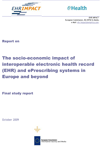Article of the Month!

This final report of the EHR IMPACT study addresses the conceptual framework for understanding and interpreting the study results, the study design and approach, and the essence of the impact analysis results.
The study takes a broad perspective of EHRs and ePrescribing. An EHR system can include parts of a comprehensive record, allows limited or extensive sharing of information, or may be part of a particular healthcare provider organisation (HPO) patient record. It usually does not contain all the health-related life-long data about people, often envisaged by grand strategies. ePrescribing is usually part of a wider health information system and often includes information on prescribing policies, clinical decision and dispensing support, advice to patients and carers, and tools to facilitate the processes and roles of each stakeholder needed to convert prescribing decisions into administered medications.
Interoperability is defined as the ability to exchange, understand and act on patient and other health information and knowledge among linguistically and culturally disparate clinicians, patients and other actors, within and across jurisdictions, in a collaborative manner. EHRI distinguishes between three levels of interoperability, which are potential interoperability, limited connectivity, and extended actual connectivity.
The goals of the EHR IMPACT study required an inductive, empirical approach. Two perspectives were applied, the socio-economic, and a narrower, financial one within the socio-economic. This dual perspective in the EHR IMPACT methodology provides a rigorous evaluation of the long-term impacts of interoperable EHR and ePrescribing systems. The case studies provide empirical insights that underpin findings on the socio-economic impact of interoperable EHR and ePrescribing systems and the factors that need to be in place to accelerate their successful deployment.
Download The Socio-Economic Impact of Interoperable Electronic Health Record (EHR) and ePrescribing Systems in Europe and Beyond - Final Report (.pdf, 581 KB).
Download from the eHealthNews.EU Portal's mirror: The Socio-Economic Impact of Interoperable Electronic Health Record (EHR) and ePrescribing Systems in Europe and Beyond - Final Report (.pdf, 581 KB).
For further information, please visit:
http://www.ehr-impact.eu
Related news articles:
- empirica's Profile
About empirica
empirica Gesellschaft für Kommunikations- und Technologieforschung mbH (empirica) has many years of experience in quantitative and qualitative research methods. Its clients are private companies and public bodies: large and medium-sized companies in the insurance, pharmaceutical and automobile industries as well as software developers and hardware manufacturers. There are also telecommunications service companies and network providers, social services firms, medical facilities, Federal and State Government ministries in Germany and the European Commission as well as the European statistical office (Eurostat). For further information, please visit www.empirica.com.